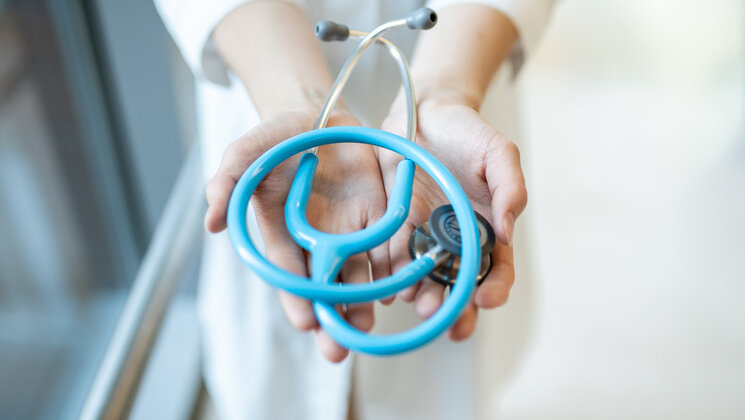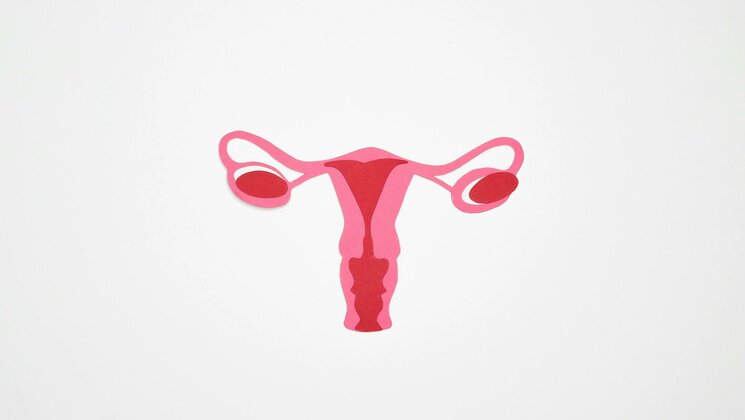PATSAFE
Developing the University of Tartu into a well-networked PATient SAFEty research centre in Estonia
Associate Professor in Internal Medicine Kaja Põlluste was attending at the ISQua International Conference of Designing for the future: Community, Resiliance and Sustainability in Brisbane 17th-20th October 2022 with 3 posters about PATSAFE.
Her poster got ISQua best poster award!
Look for the poster here:
Here are 2 more posters :
All authors have agreed to publish their conference presentations!
Here are the SLIDES!
Here are the POSTERS:
MVCM.TK.216 Patsiendiohutus ja sellega seotud probleemid tervishoius
MVCM.TK.239 Kahjujuhtumite analüüsi meetodid ja patsiendiohutuse parandamine (I)
MVCM.TK.258 Kahjujuhtumite analüüsi meetodid ja patsiendiohutuse parandamine (II)
MVCM.TK.278 Rakendusteadus ja patsiendi ohutuse parandamine
MVCM.TK.226 Patsiendiohutuskultuur
MVCM.TK.227 Patsientide kaasamine patsiendiohutuse edendamisse ja teadustöösse
MVCM.TK.256 Eesti tervishoiuasutusse sobivate patsiendiohutuskultuuri mõõdikute valideerimise tehnikad
MVCM.TK.267 Sissejuhatus kirjanduse ülevaadetesse: mida, miks ja kuidas
MVCM.TK.263 Inimeste ja muudatuste juhtimine kliinilises keskkonnas
MVCM.TK.266 Intellektuaalomand teadustöös ja teadustulemuste kommertsialiseerimine
MVCM.TK.237 Sissejuhatus kvalitatiivsesse uurimismetoodikasse
PATSAFE project conference "Patient Safety in Estonia: Linking research, education, policy and practice" in Tallinn, Estonia, June 3rd, 2022.
PATSAFE project summary by illustrations
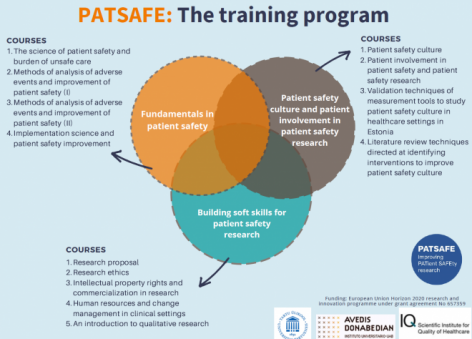

Module 1. Fundamentals in patient safety:
- The science of patient safety and the burden of unsafe care (MVCM.TK.216) REGISTER HERE
- Methods of analysis of adverse events and improvement of patient safety (I) (MVCM.TK.239) REGISTER HERE
- Methods of analysis of adverse events and improvement of patient safety (II) (MVCM.TK.258) REGISTER HERE
- Implementation science and patient safety improvement (MVCM.TK.278) REGISTER HERE
- Patient safety culture (MVCM.TK.226) REGISTER HERE
- Patient involvement in patient safety and research (MVCM.TK.227) REGISTER HERE
- Validation techniques of measurement tools to study patient safety culture in healthcare settings in Estonia (MVCM.TK.256) REGISTER HERE
- An introduction on literature reviews: what, why and how (MVCM.TK.267) REGISTER HERE
- Intellectual property rights (IPR) and commercialization in research (MVCM.TK.266) REGISTER HERE
- Human resourses (HR) and change management in clinical setting (MVCM.TK.263) REGISTER HERE
- An introduction to qualitative research (MVCM.TK.237) REGISTER HERE
The PATSAFE project is aimed at improving and strengthening the Institute of Clinical Medicine of the University of Tartu (ICM-UT) patient safety research capacity with the special focus on the improvement of knowledge and skills in methods, technics and experience for patient safety research.
Specific objectives
- To strengthen the scientific and technological capacity of ICM-UT and raise early stage researchers (ESR) and staff research profile in the field of identification and measurement of risks and hazards in patient safety by linking it with two internationally-leading research institutions in the field.
- To increase the research capacity and to ensure the continuity and sustainability in patient safety research in ICM-UT by focusing on patient safety culture and patient empowerment on their safety.
- To increase the soft skills of ESRs.
- To increase the visibility of ICM-UT’s excellence in patient safety research and its potential as a partner to internationally leading European and global research and policy counterparts as well to strengthen ICM-UT´s networking capacity and credibility on the national and international level.
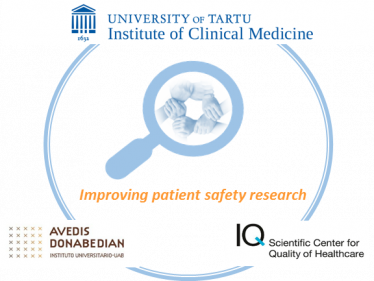
Project partners are international leaders in patient safety research - Avedis Donabedian Foundation from Spain and IQ Healthcare from The Netherlands.
Additional information
Kaja Põlluste
PATSAFE project manager
Associate Professor in Internal Medicine of the University of Tartu
+372 731 8616
kaja.polluste@ut.ee
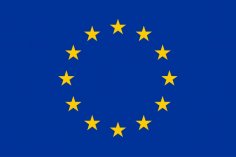
This project has received funding from the European Union’s Horizon 2020 research and innovation programme under grant agreement No. 857359.


